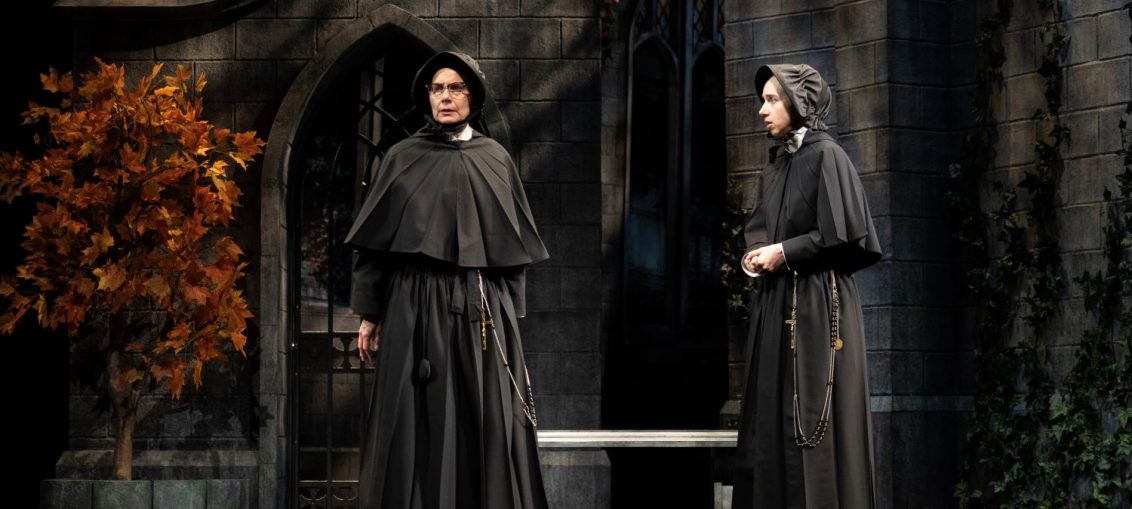
When John Patrick Shanley wrote Doubt in 2004, it was (allegedly) meant to be a parable, connecting the bombshell 2002 Boston Globe expose of sexual abuse by Catholic priests with the U.S.’ 2003 invasion of Iraq. That invasion was sanctioned in a bid to find weapons of mass destruction the Iraqi government was allegedly stockpiling—an allegation that was later determined to be false. Shanley’s play—which follows a strict nun’s efforts to expose a convivial priest as a child molester in 1964—opened in late 2004 and went on to win the 2005 Pulitzer Prize for Drama and the Tony Award for Best Play after its Broadway transfer. It ran for more than a year on Broadway—a rare feat for a play.
The current Roundabout Theatre Company revival, directed by Scott Ellis, is chillingly timely. While it seems no dialog has been changed in 20 years, the play feels less connected to a disastrous Middle East war from decades ago and much more about modern-day social and political antagonism. It is not hard to imagine Sister Aloysius ranting angrily about pronouns or insisting that laws restricting women’s rights are for the best. Neither is it hard to imagine Father Flynn talking about the Marvel Cinematic Universe with his students. While the play may have been written as a parable of inciting a war on a spurious pretext, it also is about the anxiety of changing times and values, the resentment one generation has for the next and the Machiavellian choice between earning affection or fear. Some things don’t change much in just a few decades.
Amy Ryan—who replaced Tyne Daly in the role just as previews began—is a formidable Sister Aloysius, convinced of her righteousness and trapped in a world created by men for male empowerment. As principal of the Bronx school, she wields more power than many other women around her (certainly the women who appear onstage), but her frustration with the limitations the Church places on that power becomes increasingly apparent as the play goes on. Liev Schreiber, in turn, plays Father Flynn with a combination of affable charm and something ineffable—it could be natural awkwardness, it could be a guilty conscience or it could be a fear of exposure. A more looming, dominating presence than Brian F. O’Byrne was in the original production, Schreiber’s sense of his own authority and power make his Flynn as frightening as Sister Aloysius.
Zoe Kazan plays the young Sister James with an endearing timidity that gradually shifts into a more complex uncertainty. James, of all the characters, best embodies the cultural changes of the 1960s, and Kazan’s reactions to the battle before her are exciting to behold. James desperately wants to believe the best about people, but as Aloysius and Flynn battle for power, she will have to accept that one of them is fundamentally—if not horrifyingly—wrong. Kazan makes James’ growing realization of that fact thrilling to watch. In her one scene as the student’s mother, Quincy Tyler Bernstine manages to balance the determination of a woman protecting her child’s future and the pain of knowing that future could come at a terrible cost. The brief scene is gutwrenching and Bernstine manages to convey a range of powerful, conflicting emotions in just a few moments.
Ellis’ direction emphasizes the shifting power dynamics among the four characters, particularly when Ryan and Schriber go head to head. The timing of the story is significant: The Civil Rights Act was signed in 1964, preventing discrimination based on gender or race—but the Catholic church still prohibits women from holding authority over priests. That same Act was also meant to stop discrimination based on race, but Mrs. Muller is fully aware that her son—the first Black student to attend the school—has more challenges ahead of him than he deserves. Ellis puts this unfairness and inequality front and center throughout the production, letting Shanley’s 20-year-old words remind us of the powerlessness so many people felt just 60 years ago.
David Rockwell’s rotating set keeps the audience looking at both sides of the convent walls, conveying the dual nature of the characters and their battles—both with each other and with the world at large. Kenneth Posner lights alternate between harsh and gentle, nicely suggesting the comfort of faith, the warmth of religion—and the danger that lies beneath the surface. Linda Cho’s dark costumes suit the mood nicely, while Mikaal Sulaiman’s sound encourages the audience to listen in. Doubt is a quiet, thought-provoking play, and this intelligent production revels in both Shanley’s words and silences alike.
 Saturday, December 27, 2025
Saturday, December 27, 2025